Alien: Covenant Review
"The path to paradise begins in hell"
Alien: Covenant, the second installment in the
Alien prequel series and sixth movie in the franchise overall (not counting the spin-offs) learns from some of its predecessor
Prometheus' mistakes - but not all.
The plot revolves around the crew of the colony ship Covenant, who discover a remote, uncharted planet that has all the makings of a suitable habitat for humans. They decide to take a closer look, only to discover that planet has a horrifying, deadly secret.
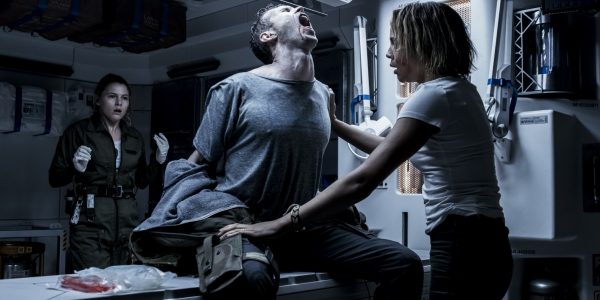
Even though this movie is essentially
Prometheus 2, in that it's a continuation of both the story and themes of the original
Prometheus, the fact that its title aligns it more closely with the original series makes sense. The second prequel not only provides much clearer answers to questions about the backstory of the xenomorphs - it falls back into familiar territory both narratively and stylistically speaking.
In a bizarre twist, that means the titular aliens are actually the least interesting part of the whole movie. Their reproductive cycle, their appearance, their behavior - whether you've seen the previous movies or not, you're probably at least somewhat familiar with the xenomorphs, who by this point are pop culture icons. Facehuggers, chestbursters, we all know the drill - but the crew of the Covenant don't. They have to learn a lot of things that audiences already know and that inherently takes away from the fear and the level of threat that the xenomorphs pose. Seeing the aliens in
Covenant is like meeting an old friend, instead of encountering a terrifying, deadly monster.
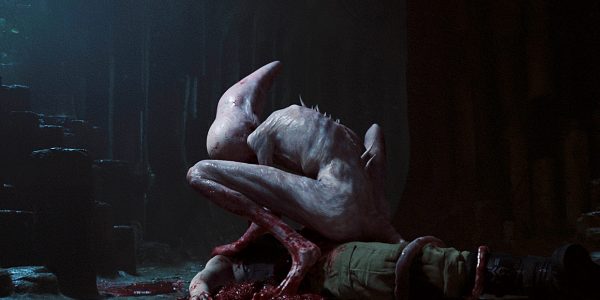
Sure,
Covenant throws in some twists - the so-called neomorphs are sprier, have a different appearance and can burst out of other places besides people's chests - but it's a pretty slight twist on a familiar formula. For the most part,
Covenant is content to stick to what we've already seen the xenomorphs do in a bunch of other
Alien movies, except it gets to do it with better special effects.
That being said, if the human characters are interesting enough, you could still get invested in their fight for survival against the xenomorphs. Fortunately, characterization is one aspect that has been noticeably improved since the first prequel. Unlike the crew of the Prometheus, which consisted of morons of either the blithering or underwritten variety, the crew of the Covenant are more developed, more competent and likable - up to a point.
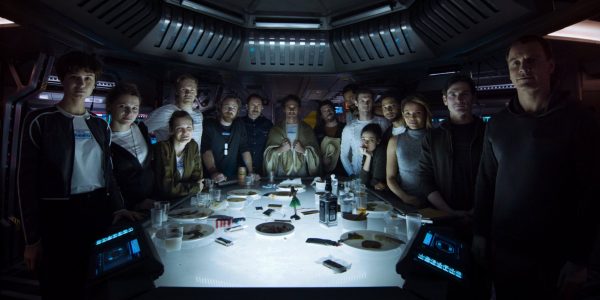 Covenant
Covenant spends a good amount of time with the crew before they land on the planet. There's second-in-command Daniels (Katherine Waterston), who's dealing with a recent personal tragedy, Captain Oram (Billy Crudup), who isn't sure he's cut out for leadership and the android Walter (Michael Fassbender), who is similar to David from
Prometheus, but not quite. The only other crew member of real note is Tennessee (Danny McBride), because... well, because it's Danny McBride in an
Alien movie - although he's actually quite good in it, so there's that too.
Much like in
Prometheus, Michael Fassbender steals the show. He's both captivating and deeply unnerving as an android and there's a lot more character development to be had here than in the previous installment.
While some crew members are more forgettable than others, there is no character in
Alien: Covenant that is really unlikable - a vast improvement over Prometheus, which often relied on its characters acting in nonsensical or obnoxious ways to drive the plot forward. Once the Covenant crew get to the planet, however, they commit a classic
Prometheus blunder.
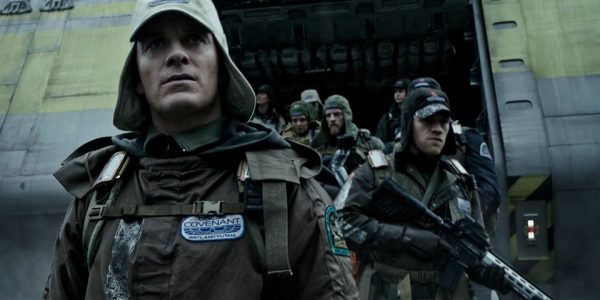
It's an unknown planet, people. Just because the air is breathable doesn't mean there isn't something in it that might be hazardous to your health. If the Covenant crew had just worn full body suits on their reconnaissance, they could have saved themselves a lot of trouble. Apart from that and a few other moments of dumb, however, the characters mostly act in ways that make sense.
Unfortunately, at a certain point,
Alien: Covenant seems to stop caring about its human characters. Any further details would venture too far into spoiler territory, but basically, once
Covenant starts answering questions left over from
Prometheus, it's clear that it is way more interested in exploring that than it is in the human crew - whose only real purpose during all of this is to be cannon fodder for the xenomorphs. As a result, most of the human characters don't really get proper resolutions. Daniels has the makings of a Ripley in her and Waterston is great in the role, but the character never really comes together.
In addition, the twist ending is just insultingly obvious. Not just because this is a prequel and it needs to end in a way that will eventually lead into the events of the original
Alien - it's just outright transparent how the movie will end. It's boring. It's so boring that it actually takes away from the sense of urgency that the two (yes, two) climactic final encounters with the xenomorphs have.
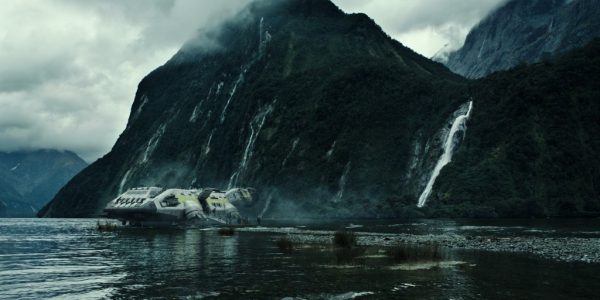
Visually, the movie is stunning - noticeably darker than
Prometheus, which was hardly sunshine and rainbows to begin with. Gorgeous, yet foreboding alien landscapes and architecture mixed in with familiar spaceship interiors. One of the most memorable locations in the film is a gloomy cave, full of [spoilers].
Overall,
Alien: Covenant is a step in the right direction, but only a step. It helps the prequel series find its footing and deliver some effective, if all too familiar thrills and unlike
Prometheus, it actually gives answers instead of piling on more questions.
Pros
- Visually stunning
- Michael Fassbender's scene-stealing performance
- Likable, fleshed out human characters
- Provides definitive answers for Alien fans
Cons
- Aliens are too familiar of a threat
- Second half sidetracks the human characters
- Twist ending is painfully obvious
-
 Even though this movie is essentially Prometheus 2, in that it's a continuation of both the story and themes of the original Prometheus, the fact that its title aligns it more closely with the original series makes sense. The second prequel not only provides much clearer answers to questions about the backstory of the xenomorphs - it falls back into familiar territory both narratively and stylistically speaking.
In a bizarre twist, that means the titular aliens are actually the least interesting part of the whole movie. Their reproductive cycle, their appearance, their behavior - whether you've seen the previous movies or not, you're probably at least somewhat familiar with the xenomorphs, who by this point are pop culture icons. Facehuggers, chestbursters, we all know the drill - but the crew of the Covenant don't. They have to learn a lot of things that audiences already know and that inherently takes away from the fear and the level of threat that the xenomorphs pose. Seeing the aliens in Covenant is like meeting an old friend, instead of encountering a terrifying, deadly monster.
Even though this movie is essentially Prometheus 2, in that it's a continuation of both the story and themes of the original Prometheus, the fact that its title aligns it more closely with the original series makes sense. The second prequel not only provides much clearer answers to questions about the backstory of the xenomorphs - it falls back into familiar territory both narratively and stylistically speaking.
In a bizarre twist, that means the titular aliens are actually the least interesting part of the whole movie. Their reproductive cycle, their appearance, their behavior - whether you've seen the previous movies or not, you're probably at least somewhat familiar with the xenomorphs, who by this point are pop culture icons. Facehuggers, chestbursters, we all know the drill - but the crew of the Covenant don't. They have to learn a lot of things that audiences already know and that inherently takes away from the fear and the level of threat that the xenomorphs pose. Seeing the aliens in Covenant is like meeting an old friend, instead of encountering a terrifying, deadly monster. Sure, Covenant throws in some twists - the so-called neomorphs are sprier, have a different appearance and can burst out of other places besides people's chests - but it's a pretty slight twist on a familiar formula. For the most part, Covenant is content to stick to what we've already seen the xenomorphs do in a bunch of other Alien movies, except it gets to do it with better special effects.
That being said, if the human characters are interesting enough, you could still get invested in their fight for survival against the xenomorphs. Fortunately, characterization is one aspect that has been noticeably improved since the first prequel. Unlike the crew of the Prometheus, which consisted of morons of either the blithering or underwritten variety, the crew of the Covenant are more developed, more competent and likable - up to a point.
Sure, Covenant throws in some twists - the so-called neomorphs are sprier, have a different appearance and can burst out of other places besides people's chests - but it's a pretty slight twist on a familiar formula. For the most part, Covenant is content to stick to what we've already seen the xenomorphs do in a bunch of other Alien movies, except it gets to do it with better special effects.
That being said, if the human characters are interesting enough, you could still get invested in their fight for survival against the xenomorphs. Fortunately, characterization is one aspect that has been noticeably improved since the first prequel. Unlike the crew of the Prometheus, which consisted of morons of either the blithering or underwritten variety, the crew of the Covenant are more developed, more competent and likable - up to a point. Covenant spends a good amount of time with the crew before they land on the planet. There's second-in-command Daniels (Katherine Waterston), who's dealing with a recent personal tragedy, Captain Oram (Billy Crudup), who isn't sure he's cut out for leadership and the android Walter (Michael Fassbender), who is similar to David from Prometheus, but not quite. The only other crew member of real note is Tennessee (Danny McBride), because... well, because it's Danny McBride in an Alien movie - although he's actually quite good in it, so there's that too.
Much like in Prometheus, Michael Fassbender steals the show. He's both captivating and deeply unnerving as an android and there's a lot more character development to be had here than in the previous installment.
While some crew members are more forgettable than others, there is no character in Alien: Covenant that is really unlikable - a vast improvement over Prometheus, which often relied on its characters acting in nonsensical or obnoxious ways to drive the plot forward. Once the Covenant crew get to the planet, however, they commit a classic Prometheus blunder.
Covenant spends a good amount of time with the crew before they land on the planet. There's second-in-command Daniels (Katherine Waterston), who's dealing with a recent personal tragedy, Captain Oram (Billy Crudup), who isn't sure he's cut out for leadership and the android Walter (Michael Fassbender), who is similar to David from Prometheus, but not quite. The only other crew member of real note is Tennessee (Danny McBride), because... well, because it's Danny McBride in an Alien movie - although he's actually quite good in it, so there's that too.
Much like in Prometheus, Michael Fassbender steals the show. He's both captivating and deeply unnerving as an android and there's a lot more character development to be had here than in the previous installment.
While some crew members are more forgettable than others, there is no character in Alien: Covenant that is really unlikable - a vast improvement over Prometheus, which often relied on its characters acting in nonsensical or obnoxious ways to drive the plot forward. Once the Covenant crew get to the planet, however, they commit a classic Prometheus blunder.
 It's an unknown planet, people. Just because the air is breathable doesn't mean there isn't something in it that might be hazardous to your health. If the Covenant crew had just worn full body suits on their reconnaissance, they could have saved themselves a lot of trouble. Apart from that and a few other moments of dumb, however, the characters mostly act in ways that make sense.
Unfortunately, at a certain point, Alien: Covenant seems to stop caring about its human characters. Any further details would venture too far into spoiler territory, but basically, once Covenant starts answering questions left over from Prometheus, it's clear that it is way more interested in exploring that than it is in the human crew - whose only real purpose during all of this is to be cannon fodder for the xenomorphs. As a result, most of the human characters don't really get proper resolutions. Daniels has the makings of a Ripley in her and Waterston is great in the role, but the character never really comes together.
In addition, the twist ending is just insultingly obvious. Not just because this is a prequel and it needs to end in a way that will eventually lead into the events of the original Alien - it's just outright transparent how the movie will end. It's boring. It's so boring that it actually takes away from the sense of urgency that the two (yes, two) climactic final encounters with the xenomorphs have.
It's an unknown planet, people. Just because the air is breathable doesn't mean there isn't something in it that might be hazardous to your health. If the Covenant crew had just worn full body suits on their reconnaissance, they could have saved themselves a lot of trouble. Apart from that and a few other moments of dumb, however, the characters mostly act in ways that make sense.
Unfortunately, at a certain point, Alien: Covenant seems to stop caring about its human characters. Any further details would venture too far into spoiler territory, but basically, once Covenant starts answering questions left over from Prometheus, it's clear that it is way more interested in exploring that than it is in the human crew - whose only real purpose during all of this is to be cannon fodder for the xenomorphs. As a result, most of the human characters don't really get proper resolutions. Daniels has the makings of a Ripley in her and Waterston is great in the role, but the character never really comes together.
In addition, the twist ending is just insultingly obvious. Not just because this is a prequel and it needs to end in a way that will eventually lead into the events of the original Alien - it's just outright transparent how the movie will end. It's boring. It's so boring that it actually takes away from the sense of urgency that the two (yes, two) climactic final encounters with the xenomorphs have.  Visually, the movie is stunning - noticeably darker than Prometheus, which was hardly sunshine and rainbows to begin with. Gorgeous, yet foreboding alien landscapes and architecture mixed in with familiar spaceship interiors. One of the most memorable locations in the film is a gloomy cave, full of [spoilers].
Overall, Alien: Covenant is a step in the right direction, but only a step. It helps the prequel series find its footing and deliver some effective, if all too familiar thrills and unlike Prometheus, it actually gives answers instead of piling on more questions.
Visually, the movie is stunning - noticeably darker than Prometheus, which was hardly sunshine and rainbows to begin with. Gorgeous, yet foreboding alien landscapes and architecture mixed in with familiar spaceship interiors. One of the most memorable locations in the film is a gloomy cave, full of [spoilers].
Overall, Alien: Covenant is a step in the right direction, but only a step. It helps the prequel series find its footing and deliver some effective, if all too familiar thrills and unlike Prometheus, it actually gives answers instead of piling on more questions.